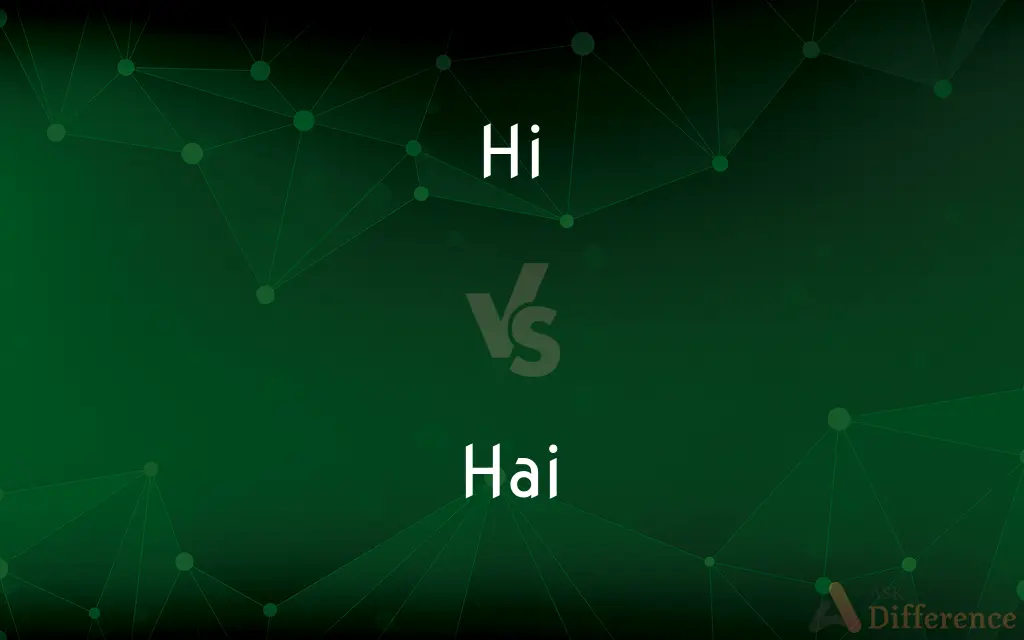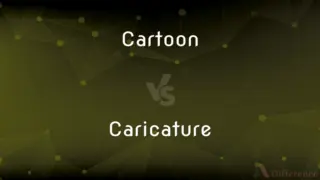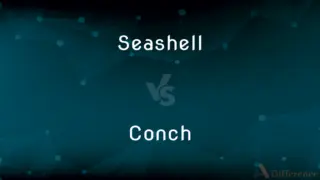Hi vs. Hai — What's the Difference?
By Tayyaba Rehman & Urooj Arif — Updated on April 26, 2024
"Hi" is a common, informal greeting in English, while "Hai" can either be a misspelling of "hi" or mean "yes" in Italian and Indonesian.

Difference Between Hi and Hai
Table of Contents
ADVERTISEMENT
Key Differences
"Hi" is a friendly, casual way to greet someone in English, widely recognized and used in various forms of communication. Whereas "Hai" is less commonly used in English and may often be seen as a typo or informal text variation of "hi".
"Hi" serves as a universal greeting in English-speaking contexts and is adaptable to both written and spoken forms. On the other hand, "Hai" in Italian and Indonesian translates to an affirmative "yes," which has no relation to greetings but rather is used to express agreement or confirmation.
In digital communication, "hi" is often employed to initiate conversation and is suitable in both formal and informal settings. Whereas "Hai," when used in place of "hi," might reflect a casual or playful tone, potentially aimed at capturing the reader's attention in informal texts or social media.
"Hi" can be effectively used across a range of contexts, from emails to instant messages, without the risk of misunderstanding. On the other hand, using "Hai" in English conversations could lead to confusion unless it is clear from context that it's being used colloquially or in jest.
While "hi" has no other meanings in English, "Hai" can introduce complexities when used by speakers of Italian or Indonesian, where its meaning changes significantly, impacting how it is understood in bilingual contexts.
ADVERTISEMENT
Comparison Chart
Language of Origin
English
Italian, Indonesian
Meaning
Greeting ("hello")
"Yes" (in Italian/Indonesian)
Usage in Communication
Greeting in any context
Affirmative or as informal "hi" in texts
Tone
Friendly, informal
Playful, casual or formal (based on language)
Contextual Suitability
Universal in English
Specific to language and setting
Compare with Definitions
Hi
An informal salutation.
I just wanted to drop by and say hi.
Hai
Used to show agreement in a conversation.
Should we order pizza? Hai!
Hi
A common opening in emails and messages.
Hi Mark, got a minute?
Hai
Can indicate enthusiasm in responses.
Hai, that sounds great!
Hi
Used in casual speech.
Hi everyone, thanks for coming!
Hai
Italian and Indonesian for "yes."
Hai, I agree with you.
Hi
A greeting used to express hello.
Hi, how are you today?
Hai
Informal variant of "hi" in English texts.
Hai! What’s up?
Hi
A friendly way to acknowledge someone.
I saw her across the street and said hi.
Hai
Often used in digital communication for brevity.
Hai, can you send me the file?
Hi
Used to express greeting. See Note at hey.
Hai
(Internet slang) hi
Hi
A friendly, informal, casual greeting said upon someone's arrival.
Hi, how are you?
I just dropped by to say “hi”.
Hi
An exclamation to call attention.
Hi
(dated) Expressing wonder or derision.
Hi
The word "hi" used as a greeting.
I didn't even get a hi.
Hi
Informal spelling of high, often in hyphenated terms.
Get hi-quality videos here!
Hi
An expression of greeting;
Every morning they exchanged polite hellos
Hi
A state in the United States in the central Pacific on the Hawaiian Islands
Common Curiosities
Can "hai" be used in formal Italian or Indonesian contexts?
Yes, "hai" is a standard way to say "yes" in both formal and informal settings in Italian and Indonesian.
Is "hi" appropriate for formal communications?
While informal, "hi" can be used in semi-formal communications like business emails depending on the context and relationship.
What are the risks of using "hai" in English?
Using "hai" in English might confuse readers who are not familiar with it as slang or typo for "hi."
How do different cultures use "hai" in greetings?
While "hai" is not used as a greeting in Italian and Indonesian, it is sometimes used colloquially in English digital communications.
How can "hai" be interpreted in different languages?
In Italian and Indonesian, "hai" means "yes," whereas in English, it might be used informally for "hi."
What is "hi" commonly used for?
"Hi" is commonly used as a casual greeting in English.
Does "hi" have any other meanings in English?
No, "hi" is specifically a greeting.
Can "hai" be mistaken for "hi" in text communications?
Yes, "hai" is often seen as a playful or informal misspelling of "hi" in text messages.
What alternatives to "hi" can be used to avoid confusion with "hai"?
Using "hello" or more specific greetings can help avoid confusion.
Are there contexts where "hi" should not be used?
"Hi" might be too casual for very formal or traditional professional settings.
Is "hai" recognized globally?
"Hai" as "yes" is recognized in Italian and Indonesian contexts, but may not be widely recognized elsewhere.
How can non-native speakers effectively use "hi"?
Non-native speakers can use "hi" in any informal setting to initiate greetings or conversation.
How does the use of "hi" affect the tone of communication?
Using "hi" generally sets a friendly and approachable tone.
Is there an etiquette for using "hi" in emails?
It's typically acceptable to use "hi" followed by the recipient's first name in less formal email communications.
What linguistic variations exist for "hai"?
Linguistic variations of "hai" depend on the language, primarily used for affirmation in Italian and Indonesian.
Share Your Discovery

Previous Comparison
Cartoon vs. Caricature
Next Comparison
Seashell vs. ConchAuthor Spotlight
Written by
Tayyaba RehmanTayyaba Rehman is a distinguished writer, currently serving as a primary contributor to askdifference.com. As a researcher in semantics and etymology, Tayyaba's passion for the complexity of languages and their distinctions has found a perfect home on the platform. Tayyaba delves into the intricacies of language, distinguishing between commonly confused words and phrases, thereby providing clarity for readers worldwide.
Co-written by
Urooj ArifUrooj is a skilled content writer at Ask Difference, known for her exceptional ability to simplify complex topics into engaging and informative content. With a passion for research and a flair for clear, concise writing, she consistently delivers articles that resonate with our diverse audience.














































